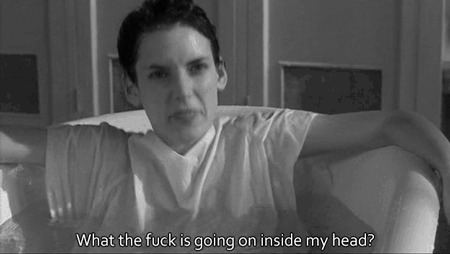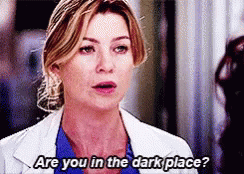
How to Pick, Research and Implement Mental Disorder in a Character
So last time I talked in general about some basic concepts and principles about what constitutes mental illness, or, more accurately, mental disorder. The important thing to remember and keep from all of that is this set of truths about any mental disorder:
1. Mental disorders are frequent and prevalent
2. Mental disorders are NOT necessarily permanent (in fact, most of them are not)
3. There is a wide range of mental disorders with a LOT of different symptoms of varying gravity
4. Mental disorders are a challenge, not bling that makes a character cool by default (though the character themselves can totally be cool)
So now you're sitting down to design your character that will be having one or more of them (mental disorders can be comorbid, i.e. more than one manifesting in one person at the same time). How to go about it?
First of all, ask yourself “why am I including a mental disorder?”
It might sound dumb, but it's very important- you have to be very much aware WHY you want to portray the character thus. Even (especially) if your sole purpose is to explore the mental disorder just for the sake of it. All answers you may give are going to be good reasons except if your answer is “because it sounds cool”. 
If that is the case, or if you fear that is the case, test yourself by considering the same character without the mental disorder- does that affect the plot in any significant way, be it in his relationship with other characters or how he reacts to specific things that occur? If the answer is yes, go for it. If it is no, best to just nix that element from your character design.
So you have asked yourself the question, and you have decided that yes, you're going forth with the mental disorder. Now you need to pick it. If you already know what you want to portray (or if you THINK you know), then the first thing you must do now is research it well.
Researching for a mental disorder includes (but isn't limited to) the following:
1. Read the entry for the mental disorder in the DSM-5 (You can download the whole manual for free here )
Alternatively you can just google the DSM fact sheet, but the manual is usually more thorough.
Read very carefully all the parameters (symptoms/ criteria, associated feature, environmental and other factors contributing to the disorder, and especially conditions that would forbid potentially this disorder from manifesting, prognosis, and so on) that would make the disorder diagnosable if your character were to be psychologically assessed.
As you are reading, keep your character's background in your mind. Does it coincide with the requirements in the manual? Has your character been through situations, conditions and other things in his daily life and environment that would reasonably be able to match what the manual says? Is your character behaving in the way the manual says is required for diagnosis? Or is he/she manifesting just ONE element, but not any other, a fact that in most disorders would forbid a specialist from diagnosing him/her with it? 
If the disorder you've picked doesn't quite fit, then you have two options: either change the character design to fit, or look for a different disorder (usually it'll be a milder one if your set of behaviors and characteristics doesn't fit more than one or two requirements, or a graver one if there are too many that don't seem to be foreseen by the manual).
2. Look for the methods of therapy
Having picked and secured which disorder you're going to go with, now you MUST research how modern treatment is designed for the alleviation of the disorder. It doesn't matter if you are going to set your character in a day and age where he/she would be considered demonically possessed, hysteric or overcome with divine prophecy or not.
As a creator when you deal with a mental disorder you have to know extremely well what makes it tick- not only how it looks on the outside but why it manifests, and how it can be healed. Not only will you be more informed in how you write your character even in scenes that aren't centered around the mental disorder, but also in how his/her environment will aggravate or alleviate his/her condition. 
Therapy can be efficient and relatively swift if in the controlled environment of a therapist that knows what they're doing, but it's not limited to there. Everyday life can also do it, if the right factors come into play just right: a thing you have to consider as you set your stage and the constellation of characters surrounding the one with the mental disorder. 
3. Treat the character with the mental disorder as a protagonist, even if he/she isn't, while you're designing them
To be able to get to know a character with mental disorder and be able to write him/her easily in their reactions, to the point you can also write them with nuance and subtlety when you want it (rather than have them manifest like they're having episodes every two hours), you have to study and consider the character with the same care as you would a protagonist or antagonist (assuming they aren't going to be). Build their background story carefully, write out scenes of their life's story, consider what triggered the mental disorder in their lives- was it an event? was there an onset? did it just simply accrue in little behaviors until it became a thing? 
Then when you're ready, and you feel there's nothing you DON'T know about them and their mental disorder, go on and unleash them in your main story: now that you know about their mental disorder and how it affects their life, FORGET about it. Just have them be in the actual plot you're developing, interacting with the other characters and advancing or hindering the plot with what you know they are like, and how you know they behave. Write them like that and you got yourself an excellent portrayal of a character with mental disorder!
4. While reading the DSM-5 do NOT let your mind panic you into thinking you have everything you read.
You know the joke about med students reading through pathology and thinking they're about to die from every terminal disease in the book? 
It happens to psych students too. When you read the DSM-5, you will see a LOT of behaviors that might strike you as familiar, or things you do, or thinks you are thinking of doing. Stop your mind from comparing the criteria sheet to your behavior IMMEDIATELY. Human behavior is like notes on a pentagram- they're the same for everyone, but the music they make is vastly different. Just because some of the stuff you might be doing might ring a bell on a list of symptoms, doesn't mean you have whatever it is you're researching.
However if on the other hand, you feel too anxious about it and can't turn it off, don't shy away from it. Go talk to a specialist and have them tell you what they think (it's always better than what you imagine).
And that's basically your rule of thumb how to go about building a good, realistic, well rounded character that also will happen to have a mental disorder or two!
Next time in Part 3, I'll be looking at some good examples of how this was done!
How do you go about writing mental disorder?
Special thanks to our patrons!!

Justnopoint - Banes - Rmccool - Abt Nihil - Phoenixignis - Gunwallace - Cdmalcolm1 - PaulEberhardt - Scruff - Dragonaur - Emma Clare - dylandrawsdraws -
drinds -

Writing Mental Illness (Part 2)
Tantz_Aerine at 12:00AM, Jan. 19, 2019
3 likes!


©2011 WOWIO, Inc. All Rights Reserved Mastodon





Kou the Mad at 1:23PM, Jan. 20, 2019
Helps if you have the mental disorder in question. Gives you context. Your probably gonna write autism better if your autistic since your unlikely to just write a caricature.
Tantz_Aerine at 10:59AM, Jan. 19, 2019
Great points, everyone! Keep 'em coming
DaniBoy at 8:42AM, Jan. 19, 2019
I'm soooo sorry for the long response! I got really carried away. This continuation of your article is really good, great job!
DaniBoy at 8:42AM, Jan. 19, 2019
2. Do they have a support system? How do they go about their day to day life? What is their mood like? How do they treat their issue? Do they use medication or are they trying to go a more holistic route? How does this affect their self-care? How does medication affect their personality and what side effects do they suffer from, if any? It's good to also know that some mental illnesses/disorders can sometimes be hereditary, such as schizophrenia or bi-polar disorder. There's a huuuuge world of stuff you can get into when studying mental health for your story! Also as a quick add to '2', some people go through several before finding one (or two. Some people have multiple Therapists or Psychiatrists) that they feel comfortable with. Some don't like seeing mental health professionals at all... of course this is all if you want to practically do a character study, considering most of these factors wouldn't have much affect, or may be detrimental to your overall plot. -
DaniBoy at 8:40AM, Jan. 19, 2019
1. These are some great points, and suggestions for writing a character with mental problems. To add onto '1', when doing research it doesn't help to only read textbook definitions because how that illness/disorder affects a person varies due to their personality and degree of the illness. When doing research for my character(s) I casually interviewed people, those with the issue and Therapists/Psychiatrists, willing to share their experiences. There are so many people out there willing to help you understand what they're/their patients are going through, as long as you don't ask anything that would violate HIPPA. How people lived with the type of illness/disorder I was researching varied so much, some even enjoyed experiencing some of the symptoms, which is something I'd never expect. Either way, I feel a creator should figure in how their character would treat experiencing those symptoms, how others would treat that character. What are the character's coping strategies?-
bravo1102 at 5:12AM, Jan. 19, 2019
When you've hung around therapists' offices; been in group therapy; interacted with special needs children and adults as both peers and as patients; you tend to know the DSM already because you see the pathology on a daily basis. Sometimes it gets hard to write characters without these emotional issues. Or jump at any behavior in a story as a chance to diagnose an OC with whatever. Don't. Deliberately plan as in this article.
usedbooks at 4:53AM, Jan. 19, 2019
Treating mental problems in my comic actually started with a recurring musing I have had to so many series -- that with everything the characters go through, a psychiatrist in that world would make a killing. That led me to think, these characters NEED, mental health care, so why shouldn't they have it? I write a modern story in an urban setting and try to be quasi-realistic. So someone who survives a loss or an assault is going to need a little help coping. In terms of trauma (and other mental health issues), I read some research but also look to people I know closely. For example, I know someone who would have fits of rage. You could see it coming if you paid attention, and he'd shake before losing control. He took medication for a while and ultimately figured out how to mitigate by leaving situations that set him off. This inspired my character Mike, a personal favorite character, who is a wonderful emotional, gallant soul (and loses control sometimes).
usedbooks at 4:34AM, Jan. 19, 2019
I treat every character I write as a proragonist. It makes for deeper, more real characters.
JaymonRising at 12:27AM, Jan. 19, 2019
If I may add: As an aspie who's all for self-deprecation, if you plan on getting "in" on that there's a difference between "Ikr? I like making fun of myself too" and "Ikr? I like making fun of YOU too". For example, a person who knows what it's like and actually did research/interviews/their homework would show you this: https://m.youtube.com/watch?v=-Svj7O2TRao a bully just shows you...a video by Tom Law about "This actually happening alot", which will only prompt this: https://youtu.be/IPAFejOC-4I?t=15s